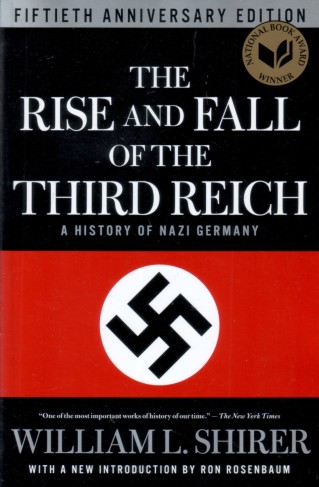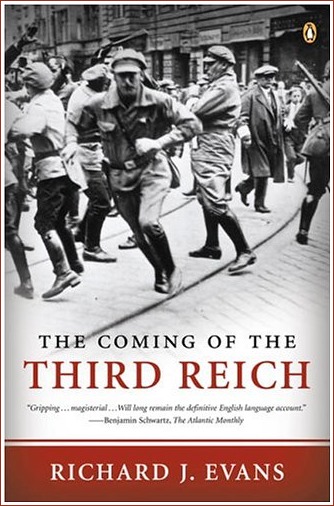Mark Twain said, “History never repeats, but it often rhymes.” Indeed, the similarities between collapsing societies can be quite stunning. Rome comes to mind. It eventually rotted away through gross mismanagement, but collapse took centuries, while our rise and fall is being made manifest over the course of a single lifetime. While the bread and circus distractions we’re forced to endure are as engaging as ever, so is communication, technology and our own collective insight.
The comparison between Rome and the US may be useful for literary symbolism, but an immediately more useful and more disturbing model would be Nazi Germany, a tyrannical government born out of what had been a sophisticated, artistic, and politically engaged industrial society.
Casual students of history know that the Nazis were able to gain power by exploiting the political, ethnic and economic tensions building during post-World War I Germany, and certainly, we are facing similar tensions today, but digging into the details gives us other insights in to the rise of totalitarian power.
Before the Nazis displaced it, the Wiemar Constitution read much like that of a traditional liberal society. It begins with the words: “The German Reich is a republic. State authority derives from the people.”
Functionally, it was similar too, although more expansive than, the US Constitution. It supported the separation of powers. It recognized international law, self-determination, equality under the law, gender equality, freedom of movement, and more. Art and culture was especially vibrant. Wiemar Germany was cited as having “the highest level of intellectual production in human history.”
 However, the commitment to the liberal democracy and freedom among the ruling elite was week from the very beginning. Support from the people faded with each crisis, eventually allowing the Nazis to rise. The most pressing issue to the average German was the collapse of the currency, which had wiped out the life savings of nearly every German holding cash instead of real assets. At the beginning of 1923, it took about 18,000 marks to purchase one US dollar. By the end of the same year, it cost nearly 4 billion marks to purchase a dollar and trillions soon after. Inflation was so bad, workers needed to be paid twice during the course of a single workday simply so they could spend their money before it lost its value.
However, the commitment to the liberal democracy and freedom among the ruling elite was week from the very beginning. Support from the people faded with each crisis, eventually allowing the Nazis to rise. The most pressing issue to the average German was the collapse of the currency, which had wiped out the life savings of nearly every German holding cash instead of real assets. At the beginning of 1923, it took about 18,000 marks to purchase one US dollar. By the end of the same year, it cost nearly 4 billion marks to purchase a dollar and trillions soon after. Inflation was so bad, workers needed to be paid twice during the course of a single workday simply so they could spend their money before it lost its value.
Historian William Shirer wrote in his 1961 seminal work The Rise and Fall of the Third Reich:
“The life savings of the middle classes and the working classes were wiped out. But something even more important was destroyed: the faith of the people in the economic structure of German society. What good were the standards and practices of such a society, which encouraged savings and investment and solemnly promised a safe return from them and then defaulted? Was this not a fraud upon the people?”
Meanwhile, the industrial elite and the Weimar government were benefiting. While certainly not a perfect comparison, history does rhyme. Shire notes that “balancing the budget” could have solved these problems.
“[Balancing the budget would be] a difficult but not impossible feat. Adequate taxation might have achieved this, but the new government did not dare to tax adequately… Instead of drastically raising taxes on those who could pay, the republican government actually reduced them in 1921.”
The establishment powers both in and out of the government directly benefited from the collapse of the currency, allowing them to pay debts with greater ease. Factory owners could purchase machinery on loan and repay the debt with worthless marks later. Not all business owners did this. Many were too afraid or uninformed to understand what action they should take, but for the intelligent and connected few, inflation created great bargains.
Inflation also benefited the state’s bottom line, allowing them to pay some of their early debts more easily, but at the expense of broad social stability. As a result, radical groups began to gain strength.
Mass unemployment continued through the 1920s and by 1932 as many as half a million German men were homeless — roughly five times the rate of homelessness per capita in the US today. Without jobs, many Germans felt they had no identity, creating a vacuum ready to be filled. (Notably, the unemployed were more likely to join the communists, while those who retained their jobs but suffered other hardships tended to back the Nazis.)
Meanwhile, the Wiemar Republic had continually failed to police the nation and itself. Historian Fritz Stern who grew up in Nazi Germany notes that the German constitution “was a perfectly reasonable document for a democratic society. The trouble is, there wasn’t a democratic society.”
Indeed, the court system, the army and other political offices were staffed with members hostile to the republic, or at the very minimum, sympathetic toward a more authoritarian form of government. Historian Richard Evans in his book, The Coming of the Third Reich, wrote about a Prussian civil servant who threatened his Marxist employees with a gun, and yet was not dismissed or severely disciplined (although he was denied a promotion).
The court system was also corrupt, readily willing to give little or no jail time to groups actively working to undermine the republic. Hitler himself was imprisoned for a mere 8 months after attempting to overthrow the government in 1923. The attempt was a very real threat and left several dead, yet the Hitler was repeatedly given leniency, first in his sentencing, then in his early parole. Meanwhile, liberals who criticized the army were charged with treason and sentenced to harsh prison sentences.
Given the choice, the establishment was more willing to back the Nazis because they feared the alternative, the “radical left.” They also had nostalgic feelings for the old monarchy, but the average German’s motivations were more simplistic. Their hatred was not of the communist revolutionaries, but of the establishment, the moderate center which had continually failed them — think Democrats and Republicans.
The Nazis pointed to corruption in the Wiemar government, both real and imagined, as a way to galvanize support long before they employed mass violence and intimidation. Consider this speech from Hiter condemning money printing in the 1920s, before his rise to power:
“The government calmly goes on printing these scraps of paper because, if it stopped, that would be the end of the government because once the printing presses stopped – and that is the prerequisite for the stabilization of the mark – the swindle would at once be brought to light… Believe me, our misery will increase. The scoundrel will get by. The reason: because the State itself has become the biggest swindler and crook. A robbers’ state!”
Anyone who knows anything about the US government’s current fiscal and monetary policies will recognize this argument. It is all too familiar for those of us who’ve watched the Federal Reserve’s controversial quantitative easing measures. Shirer makes the following commentary:
“The masses of the people, however, did not realize how much the industrial tycoons, the Army and the State were benefiting from the ruin of the currency. All they knew was that a large bank account could not buy a straggly bunch of carrots, a half peck of potatoes, a few ounces of sugar, a pound of flour. They knew that as individuals they were bankrupt. And they knew hunger when it gnawed at them, as it did daily. In their misery and hopelessness they made the Republic the scapegoat for all that had happened. Such times were heaven-sent for Adolf Hitler.”
While scapegoating the Jews was a centerpiece of Nazi ideology, the party would have had little national traction if not for its underlying economic and political message condemning the power elite for their very real failures. The people were ready to believe in a charismatic demagogue because the republic had long since ceased functioning.
Even in its infancy, the party’s cried out against the “money barons.” Shirer notes that the early Nazi supporters included in the party’s platform references to eliminating “incomes unearned by work,” a clear reference to people who make money by manipulating money itself, what Hitler called “breaking of interest slavery.” They condemned speculation and “death penalty for traitors, usurers and profiteers.” They even insisted on the maintenance of “a sound middle class.” (Most of the populist ideas were abandoned even before the Nazis officially began to take power.) And of course, the party demanded that laws forced upon the people, like the Treaty of Versailles, was in fact no law at all.
The platform was dictatorial, nationalistic and power hungry, but it positioned itself as a “catchall” designed to pick up support from all over the country from ideological and non-ideological Germans fed up with establishment power. That, as much as their scapegoating, was an important key to their early successes.
The overthrow of the US government seems highly unlikely, even laughable, however the slow and steady displacement of statesmen with unprincipled thugs is becoming increasingly apparent. The effect has been to dismantle the last remaining limits on government power. Power is derived less from the rule of law and more through fear. The path of the US looks much like the path of pre-war Germany.
The government’s ability to improve the lives of everyday Americans is increasingly limited, and in some cases, is even undesirable for them. Meanwhile, the possibility of a fascistic third party increases everyday. It may attempt to cloak itself with the legitimate outrage of a desperate and hopeless people, but we know where this ends, in disaster.
Finally, I’d just like to close with this quote from a recent column by author Chris Hedges:
“The longer the paralysis continues, the longer systems of power are unable to address the suffering and grievances of the masses, the more the formal mechanisms of power are reviled. The liberal establishment’s inability to defy corporate power, to stand up for its supposed liberal beliefs, means its inevitable disappearance, along with the disappearance of traditional liberal values. This, as history has amply pointed out, is the road to despotism. And we are further down that road than many care to admit.”


